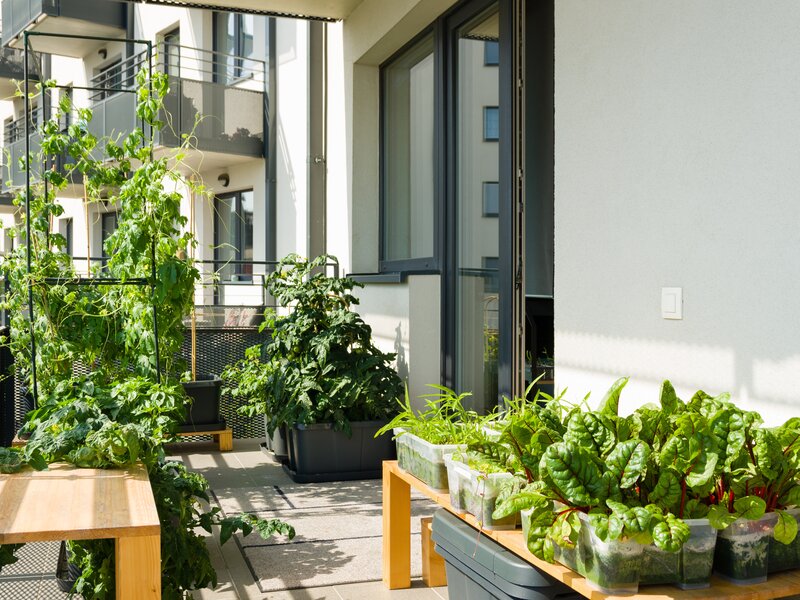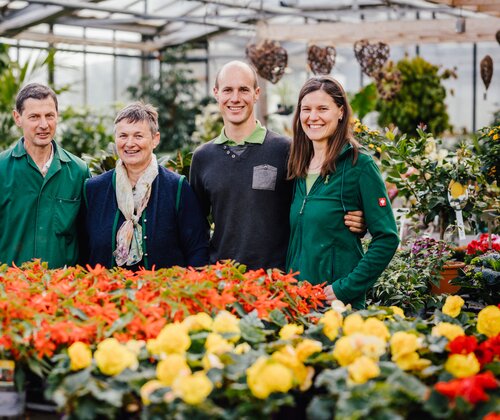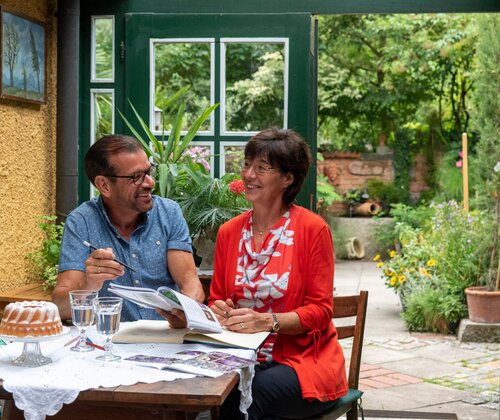
Your green balcony: an oasis of joie de vivre
With a few simple tips, you can turn your balcony into a little Garden of Eden. Whether you want to harvest fresh vegetables, grow herbs or simply create a place to relax - here are some inspiring ideas for your balcony.

Growing plants, the joy of lush growth and finally enjoying your own harvest - all this is good for the soul. You can create an ecological paradise using the permaculture method even on just a few square metres of balcony space. With a few tricks, care becomes less intensive.
Growing plants, the joy of lush growth and finally enjoying your own harvest - all this is good for the soul. You can create an ecological paradise using the permaculture method even on just a few square metres of balcony space. With a few tricks, care becomes less intensive.
The perfect alignment
Before you get started, take a look at the conditions on your balcony. The direction of the compass determines which plants are best suited to your balcony. Peach trees, strawberries, Mediterranean herbs, cucumbers, beans, chillies and tomatoes thrive on a sunny south-facing balcony. North-facing balconies, on the other hand, are better suited to plants such as lettuce, nasturtiums, rocket and chard.
Pay attention to wind and rain conditions as well as the watering requirements of your plants. Fixings for containers and climbing aids for plants can protect your green protégés from damage during storms and heavy rain. There are clever solutions to meet the water requirements of your plants that minimise your effort. Clay cones or other self-made watering aids can reduce the amount of watering required on hot days, but daily watering is still necessary. Irrigation systems can be real lifesavers for your balcony garden. These investments are worthwhile because they allow you to enjoy your green oasis without having to constantly worry about watering.
Clever plant selection
Perennial herbs or shrubs are an inexpensive option that require little care. Rosemary, thyme, lavender or sage are particularly suitable for south-facing balconies and can also overwinter on the balcony under a fleece cover. Native wild herbs such as ground ivy, camomile, yarrow or lady's mantle feel at home on the shadier north-east or west-facing balcony. They don't need as much sun and cope well with wind and rain. You can find out what you should bear in mind when planting them here step by step: Environmentally friendly care for your potted plants.
Space-saving solutions
Utilise the limited space efficiently by opting for space-saving solutions. Square containers and self-made boxes fit together seamlessly and offer enough space for your plants. Remember that larger plants such as tomatoes or cucumbers need at least 20-litre containers to grow and thrive optimally.
Perennial herbs or shrubs are an inexpensive option that require little care. Rosemary, thyme, lavender or sage are particularly suitable for south-facing balconies and can also overwinter on the balcony under a fleece cover. Native wild herbs such as ground ivy, camomile, yarrow or lady's mantle feel at home on the shadier north-east or west-facing balcony. They don't need as much sun and cope well with wind and rain. You can find out what you should bear in mind when planting them here step by step: Environmentally friendly care for your potted plants.
Space-saving solutions
Utilise the limited space efficiently by opting for space-saving solutions. Square containers and self-made boxes fit together seamlessly and offer enough space for your plants. Remember that larger plants such as tomatoes or cucumbers need at least 20-litre containers to grow and thrive optimally.
Good neighbourhoods - mixed cultivation on the balcony
In the world of plants, there is also such a thing as neighbourly help. Place plants together that support each other. Basil, for example, complements tomatoes perfectly, while lettuce, kohlrabi, marigolds or marigolds can be planted alternately in balcony boxes. Planting several plants in one pot creates an ideal microclimate, which in turn protects the plants from excessive heat. When growing, determine how much space each plant needs and do not plant them too close together. Too little space can be the reason for plant diseases or pest infestation. Diverse planting not only promotes the growth of your plants, but also attracts bees and other beneficial insects.

Compost and mulch - caring for your green oasis
Good soil is the foundation for healthy plants. Use high-quality soil and, if necessary, mix it with sand for weak eaters to optimise the supply of nutrients. Link: Black soil for raised beds and vegetables.
Fertilising is particularly necessary in the limited root space of a planter to cover the plants' nutrient requirements. Use home-made fertiliser from the bokashi household bucket to pamper your plants. Kitchen waste is transformed into fertiliser within 2 weeks.
Mulching is a real treasure for your balcony garden! By covering the soil with leaves, hay, wilted plant material, sheep's wool or wood shavings, you protect the soil from wind and evaporation and improve the soil quality at the same time. Renew the mulch layer regularly to protect your plants from heat and reduce water requirements.
Immerse yourself in the world of urban gardening and enjoy your green oasis on the balcony. With Ulrike Windsperger's handbook ‘Permaculture on the balcony’, you have a detailed guide and can get started right away.
Good soil is the foundation for healthy plants. Use high-quality soil and, if necessary, mix it with sand for weak eaters to optimise the supply of nutrients. Link: Black soil for raised beds and vegetables.
Fertilising is particularly necessary in the limited root space of a planter to cover the plants' nutrient requirements. Use home-made fertiliser from the bokashi household bucket to pamper your plants. Kitchen waste is transformed into fertiliser within 2 weeks.
Mulching is a real treasure for your balcony garden! By covering the soil with leaves, hay, wilted plant material, sheep's wool or wood shavings, you protect the soil from wind and evaporation and improve the soil quality at the same time. Renew the mulch layer regularly to protect your plants from heat and reduce water requirements.
Immerse yourself in the world of urban gardening and enjoy your green oasis on the balcony. With Ulrike Windsperger's handbook ‘Permaculture on the balcony’, you have a detailed guide and can get started right away.

In summer, plants can survive without watering despite the heat and drought if the soil is well mulched and contains enough life. Bernadette Schützenhofer does without watering all summer and still harvests the best vegetables.

By Susanne Schütz and Anne Lorch
When we dream up visions, we discover completely new facets and possibilities. They give us the strength to abandon established and proven habits. Even seemingly absurd fantasies about the future motivate us and help us to create new guidelines and behaviours, even though they seem to completely contradict the current zeitgeist.

Anyone entering Karl Ploberger's garden in Seewalchen is in a different world: lush nature that is only "tamed" in some areas and an enormous variety that reflects the credo of Austria's most famous natural garden ambassador: "No matter what you do, always draw on the wide range of plants. That's what ultimately turns a green oasis into a paradise," says Ploberger with a sparkle in his eye.
